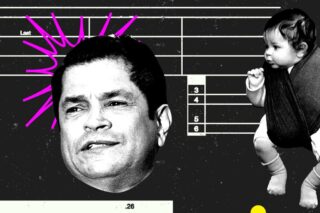
You can’t hear Jimmy Gomez too well in the wide-angle C-SPAN footage. You can’t see him very well either, until the camera starts to zoom in. The congressman from Southern California is standing in the House, next to Representative Alexandria Ocasio-Cortez. Slung on his chest, crumpling his standard-issue Washington suit, is a young gentleman named Hodge, his infant son. Hodge is admirably well behaved, his fuzzy head bobbing as his father smiles and shouts out his House leadership vote: “On behalf of my son Hodge and all the working families who need an expanded Child Tax Credit — Hakeem Jeffries!” Few of his colleagues are paying attention; Gomez even feels the need to wiggle Hodge’s legs to indicate that his son is present. The whole thing is a classic dad scenario: big buildup, stiff commitment to the bit, tepid response.
A few weeks later, alongside several colleagues, Gomez appeared outside the Capitol to announce the formation of the Congressional Dads Caucus. The group — just one of several hundred congressional member organizations — was created to advocate for legislative goals like the expanded Child Tax Credit and paid family leave; Gomez hopes, as he said after voting with Hodge, to bring “visibility to the role of working dads across the country.” Of course, working dads aren’t exactly a minority in the House — historically, the whole thing is a dads caucus, and Gomez’s group now represents only about two dozen of the chamber’s scores upon scores of male parents, few of whom appear to struggle with child care. It was for this precise reason that members formed the Moms in the House Caucus in 2019 — not just to spearhead a legislative agenda but also to help the House itself create a previously nonexistent infrastructure for mothers of young children. (“Congress wasn’t built for members like me,” Representative Katie Porter, a single mother of three school-aged children, said.) Conveniently, they also contributed to the ongoing reframing of the archetypal political mom, from the cold careerist of sexist attacks to a relatable vision of tenacity, the Mom as Fighter.
The dads caucus exists largely to amplify the same legislative priorities championed by the moms, but it has, predictably, been somewhat hapless in its image control. Gomez followed up his vote with an Instagram reel captioned “Baby Gomez takes over Congress!” The video is mostly a montage of Hodge in the arms of high-profile members: Ocasio-Cortez, Rashida Tlaib, Nancy Pelosi. There’s the aftermath of a diaper change and another shot of the chest carrier, but the clip ends with Hodge in a stroller, trailing what appears to be Gomez, who walks with purpose through the halls of Congress. This is, in other words, a video of other people interacting with Hodge while his dad is at work. Gomez will most likely not need to return to the floor of the House with Hodge, and he surely knows that working parents benefit more from reliable child care and universal pre-K than from social permission to wear a BabyBjörn to the office. But he also appears to know something else: the messaging power of a mildly doofy dad gamely changing his son’s blowout and then strapping him right back on.
Public acts of fatherhood, no matter how mundane, tend to attract positive attention. One of my earliest memories of being a father is walking our infant daughter through downtown Baton Rouge in her stroller and having several motorists slow down to lavish praise on me. (“You’re doing the right thing!” one shouted.) At the grocery store with my daughter in her carrier, rocking her to sleep on the stoop, even holding her at the doctor’s office — for these deeds I received regular, rapturous affirmation that, it probably goes without saying, is seldom the standard for moms. Visible acts of dadliness are subject to a kind of social grade inflation that Gomez is savvy to utilize.
All this generosity toward dads rests on lowered expectations. Gomez seems to be collecting the same positive reinforcement for changing Hodge’s diaper in the House cloakroom that Hodge will one day collect for using a big-boy spoon to smear mushed peas on his face for the first time. Images of dadhood have evolved — from stern authoritarianism and menacing threat to bumbling inadequacy and then back again — but the modern, middle-class, liberal dad subject is generally pictured as a figure of education. He is doing his best to learn, to catch up, to be better. He is goofy, seemingly harmless, well intentioned, sometimes self-aware but probably not aware of his kids’ next dentist appointments. Gomez understands the power of today’s dad — his jokes, his bod, his rock music, his hats. Professional moms are pilloried for the domestic duties they are perceived to have abandoned, but dads like me and Gomez are credited for social perks we’re perceived to have valiantly given up: coolness, independence, masculine command.
This, I think, is precisely what the announcement of the dads caucus sought to leverage: the high cringe of being a dad. Gomez tweeted a link to the livestream of the announcement by writing, “As Lizzo would say, it’s about damn time.” (Stop, Dad, you’re embarrassing us!) At the small news conference, the dads appeared alongside Tlaib, the group’s one mother. The mood was light, cute, with much gregarious chuckling. Representative Dan Goldman held up a note his daughter had left him on a legal pad in his very congressional-looking folio. “HI. DADDY,” it read. “I. LOVE. YOU I. WILL. GIVE YOU HUGS. AND KISSES. WHEN YOU. GET HOME.” The archetype these men deliberately embodied was both faintly embarrassing and comfortable with embarrassment — a vision of fatherhood, even masculinity, that gains what strength it has from a willingness to seem soft.
A notable aspect of both this vision and the dads caucus itself is that they are not bipartisan. An influential segment of today’s conservative movement is allergic to such embarrassment. These conservatives recognize a similar transformation in contemporary dadhood, but they register it as diminishment and decay. In the last two years, Tucker Carlson has both released a series called “The End of Men” and mocked Pete Buttigieg for taking paternity leave by saying he was “trying to figure out how to breastfeed.” On Twitter, the commentator Matt Walsh refused the very concept of paternity leave with the same energy that dads refuse instructions for Ikea furniture. The Missouri senator Josh Hawley has written a forthcoming book entitled “Manhood: The Masculine Virtues America Needs” — “A free society that despises manhood,” the promotional copy reads, “will not remain free.”
The dads caucus offers a bit of aesthetic counterprogramming to these dads under siege. The type of dad they choose to play is often caricatured as weak, but it’s also one that seems secure in its dominance of the contemporary imagination. While their opposite numbers recoil from anything that puts their nostalgic vision of dadly masculinity at risk, these dads are confident. The aura of embarrassment that can surround baby-wearing, diaper changing and paternity leave still reeks of sexism and homophobia; the congressional dads know that to give in to this embarrassment is to lose, to be lost in time. So they play it cool, or at least as cool as a bunch of middle-aged dads can. It’s all right, buddy, they whisper. Take off your AR-15 lapel pin and strap on your infant. As Lizzo would say, you’ll feel “good as hell.”
Featured image: Photo illustration by Mark Harris




